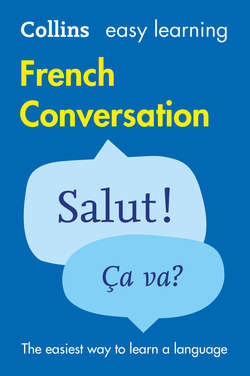Читать книгу Easy Learning French Conversation - Collins Dictionaries - Страница 103
LISTEN OUT FOR
ОглавлениеHere are some key phrases you are likely to be hear when you’re travelling around.
| Prochain arrêt:… | Next stop:… |
| Le train pour Nice part du quai numéro trois. | The train for Nice leaves from platform three. |
| Votre billet, s’il vous plaît. | Ticket, please. |
| Je peux m’asseoir ici? | Do you mind if I sit here? |
| Continuez tout droit jusqu’aux feux. | Go straight on till you get to the traffic lights. |
| Prenez la deuxième à gauche. | Take the second turning on the left. |
| C’est en face de la cathédrale. | It’s opposite the cathedral. |
| C’est tout près. | It’s very near. |
| On peut y aller à pied. | It’s within walking distance. |
| C’est à trois arrêts d’ici. | It’s three stops from here. |
Lifestyle Tips
• If you’re behind the wheel of a car, be ready to produce your driving licence if asked for it by the police. If you’ve left it behind, you may well be fined. The police officer might ask you: votre permis de conduire, s’il vous plaît (your driving licence, please). French drivers also have to be able to produce their carte grise (car registration document) and their attestation d’assurance (car insurance certificate).
• Motorways are not free in France. When you go onto the motorway, you get a ticket de péage or ticket d’entrée. When you come off the motorway this will show how many kilometres you’ve driven and how much you have to pay.
• At motorway tolls, some toll booths are manned, some are automatic (using bank cards), and some are reserved for drivers using the télépéage system which makes it possible to pay the toll via a sensor inside the car (with monthly bills sent to your address). It is best to stay clear of these lanes which are marked with a yellow “T” sign, as the drivers equipped with such sensors don’t take kindly to tourists holding up their fast lane!
• Over the past years, covoiturage (car sharing) has become quite popular in France. It can be a cheap and convenient way of getting around, especially for short distances. There are many places where you can find offers for covoiturage, but local papers, and ad boards in shops are probably your best bet.
• If you’re asked to produce your titre de transport on the bus, the train or the underground, it means that you have to show your ticket to the inspector.
• Make sure you punch your ticket before you get on the train or bus. If you have forgotten to do so, it is advisable to go and see le contrôleur (the ticket inspector) as soon as possible or you might be fined.
• If you’re in a hurry, you can hop on the train and buy a ticket for a small amount extra directly from a ticket inspector - go and see him or her as soon as you’re on the train or you might be suspected of resquillage (fare-dodging).
• Queues tend to be informal in French-speaking countries. So if you’re trying to get to an information desk and don’t know if it’s your turn, just ask C’est à moi? or C’est mon tour? (Am I next?). If you want to let someone in before you, you can say après vous (after you).
